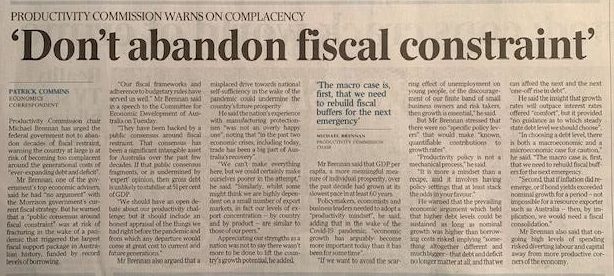Article by Patrick Commins courtesy of The Australian

Productivity Commission chair Michael Brennan has urged the federal government not to abandon decades of fiscal restraint, warning the country at large is at risk of becoming too complacent around the generational costs of “ever-expanding debt and deficit”.
Mr Brennan, one of the government’s top economic advisers, said he had “no argument” with the Morrison government’s current fiscal strategy. But he warned that a “public consensus around fiscal constraint” was at risk of fracturing in the wake of a pandemic that triggered the largest fiscal support package in Australian history, funded by record levels of borrowing.
“Our fiscal frameworks and adherence to budgetary rules have served us well,” Mr Brennan said in a speech to the Committee for Economic Development of Australia on Tuesday.
“They have been backed by a public consensus around fiscal restraint. That consensus has been a significant intangible asset for Australia over the past few decades. If that public consensus fragments, or is undermined by ‘expert’ opinion, then gross debt is unlikely to stabilise at 51 per cent of GD
“We should have an open debate about our productivity challenge; but it should include an honest appraisal of the things we had right before the pandemic and from which any departure would come at great cost to current and future generations.”
Mr Brennan also argued that a misplaced drive towards national self-sufficiency in the wake of the pandemic could undermine the country’s future prosperity
He said the nation’s experience with manufacturing protectionism “was not an overly happy one”, noting that “in the past two economic crises, including today, trade has been a big part of Australia’s recovery”.
“We can’t make everything here, but we could certainly make ourselves poorer in the attempt,” he said. “Similarly, whilst some might think we are highly dependent on a small number of export markets, in fact our levels of export concentration – by country and by product – are similar to those of our peers.”
Appreciating our strengths as a nation was not to say there wasn’t more to be done to lift the country’s growth potential, he added.
Mr Brennan said that GDP per capita, a more meaningful measure of individual prosperity, over the past decade had grown at its slowest pace in at least 60 years.
Policymakers, economists and business leaders needed to adopt a “productivity mindset”, he said, adding that in the wake of the Covid-19 pandemic, “economic growth has arguably become more important today than it has been for some time”.
“If we want to avoid the scarring effect of unemployment on young people, or the discouragement of our finite band of small business owners and risk takers, then growth is essential,” he said.
But Mr Brennan stressed that there were no “specific policy levers” that would make “known, quantifiable contributions to growth rates”.
“Productivity policy is not a mechanical process,” he said.
“It is more a mindset than a recipe, and it involves having policy settings that at least stack the odds in your favour.”
He warned that the prevailing economic argument which held that higher debt levels could be sustained as long as nominal growth was higher than borrowing costs risked implying “something altogether different and much bigger – that debt and deficit no longer matter at all; and that we can afford the next and the next ‘one-off’ rise in debt”.
He said the insight that growth rates will outpace interest rates offered “comfort”, but it provided “no guidance as to which steady state debt level we should choose”.
“In choosing a debt level, there is both a macroeconomic and a microeconomic case for caution,” he said. “The macro case is, first, that we need to rebuild fiscal buffers for the next emergency.
“Second, that if inflation did re-emerge, or if bond yields exceeded nominal growth for a period – not impossible for a resource exporter such as Australia – then, by implication, we would need a fiscal consolidation.”
Mr Brennan also said that ongoing high levels of spending risked diverting labour and capital away from more productive corners of the economy.

